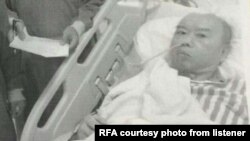International rights groups and activists are calling for an independent investigation into the circumstances surrounding the death of grassroots legal activist Ji Sizun. Ji died of cancer Wednesday in a police-guarded hospital in the southeastern province of Fujian, two months after his release from prison.
Ji’s remains were cremated by local authorities just hours after his death.
Ji, who was known as an unregistered barefoot lawyer, provided legal advice and training to socially-disadvantaged groups including women forced to have abortions and victims of forced evictions and land expropriation.
Investigate
“Chinese authorities need to investigate Ji Sizun’s hospitalization and death and hold accountable anyone responsible for wrongdoing,” said Yaqiu Wang, China researcher at Human Rights Watch, in a press statement.
“For human rights defenders in China, prison sentences are increasingly turning into death sentences,” she added.
Ji was first jailed in 2009 for three years on the charge of “forging official seals and documents” after he applied for a permit to organize protests during the 2008 Beijing Olympics.
In 2016, he was given another four-and-a-half-year jail term on charges of “gathering a crowd to disrupt public order" and "picking quarrels and stirring up trouble" after he helped petitioners organize protests and for his support for the pro-democracy movement in Hong Kong.
Ji is not the first rights defender to die in official custody, rights groups note.
Over the past few years, several Chinese dissidents have suffered a similar fate - seriously ill in detention, denied adequate care, and dead - either in detention or shortly after being released.
Those who died include dissident writer Yang Tongyan in 2017, revered Tibetan lama Tenzin Delek Rinpoche in 2015 and activist Cao Shunli in 2014, according to Human Rights Watch.
July 13th marks the second anniversary of the death of Nobel Peace Laureate Liu Xiaobo, who died of liver cancer while serving an 11-year sentence.
The fact that Ji’s remains were hurriedly cremated suggests a cover-up, said Albert Ho, chairman of China Human Rights Concern Group in Hong Kong.
Not an isolated incident
“This is not [an] isolated incident. There are so many cases where people die in official custody and after that, the bodies were immediately disposed of without the consent of the family members. And hence, their opportunity to call for [an] examination and investigation into the cause of death are actually declined,” Ho said.
Another rights activist, who spoke on condition of anonymity said Ji’s situation was “filled with more questions than answers.”
Ji was released in late April, but was kept incommunicado for 10 days before his family could finally see him, at which point he was barely conscious and in intensive care, the activist said.
With Ji's health deteriorating, local authorities placed guards outside his room to block family and friends from visiting him or monitoring his slow death.
In June, authorities even forced the family to sign a power of attorney agreement allowing them to cremate his remains without the family’s consent.
“Taken together, it’s hard not to suspect something far worse than a man succumbing to death from natural illness,” the activist said.
Ji’s family reportedly said he was in good physical condition when he entered the prison in 2014. But during his imprisonment, he suffered from high blood pressure, diabetes and coronary artery disease. His lawyers’ applications for a medical parole were repeatedly declined.
Seeking justice
Justice for the deaths of Ji and many others must be sought, or many more lives will be lost, rights groups say.
“The government’s failure to publicly account for these deaths will only mean more unnecessary loss of life in the future,” Wang of Human Rights Watch added.
Ho called on the United Nations Human Rights Council to look into this and urged China to set up a special court with inquiries conducted under public observation.
The NGO Chinese Human Rights Defenders, in a press statement, further expressed concern over the condition of many gravely ill detainees. Those placed on its medical watch list include Huang Qi, Hu Shigen and Li Yuhan, all of whom CHRD says, continue to suffer from deprivation of proper medical treatment – an internationally recognized form of torture or inhumane treatment.




